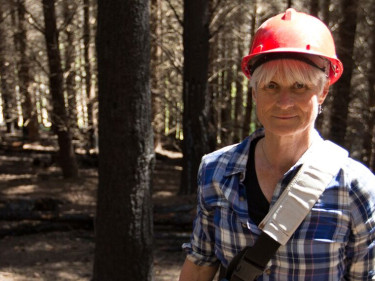Machinery is commonplace in rural areas. However, using machinery unsafely or failing to maintain machinery can increase the risk of starting a fire.
Using machinery
- Check the fire weather in your area before using machinery. Avoid operating equipment during times of very high or extreme fire danger.
- Be very careful when using machinery during dry conditions. Fires can start from the smallest spark.
- Wet down the area you're working in and have firefighting equipment handy if the conditions are dry.
- Be aware of exhaust heat and spark emission when driving through, or parking in, stubble or long dry grass. Be particularly cautious on high, very high and extreme fire danger days.
- Carry appropriate fire extinguishers, shovels, or knapsack sprayers.
- Stop using welders, chainsaws, slashers, and some tractor operations, on extreme fire danger days.
- Do welding and angle grinding only in clear areas.
- When operating a machine be aware of what could be happening outside your cab.
- If carting hay using a diesel truck that has vertical exhausts higher than the cab, cover the hay load or fix a spark-arrester shield to the exhaust.
Storing fuel and other chemicals
- Store petrol, diesel fuels and chemicals in clearly-labelled, approved containers and in single-purpose locations away from other farm buildings.
- Keep areas clean of rubbish, oily rags, firewood and other fuel sources.
Maintaining machinery
- get rid of birds’ nests from in or around motors.
- Check all machinery is free of mechanical defects that could start a fire and has approved exhaust systems and spark arresters.
- Pay special attention to checking your machinery’s bearings and moving parts.
- Clean all machinery regularly to ensure belly pans and spaces around motors are free of oil, dust, grease, grass and straw.
Farm maintenance
- Fit suitable fire extinguishers in farm buildings and on machinery.
- Keep trees and branches at least 3 metres clear of power lines. Contact your local power authority to have branches cleared.
- Keep paddocks around farm buildings and yards well grazed to reduce the fire hazard during dry conditions.
- Dry hay before baling and stacking to prevent spontaneous combustion.
Hot work
- Hot work is any job that involves using tools that could start a fire. On rural properties, this might include welding, grinding or cutting.
- Don't do hot work outdoors during prohibited fire seasons unless you have a special permit.
- Where possible, perform hot work indoors at a designated safe location, like a welding bay. If you this isn't possible, make sure you move any fire hazards or flammable materials out of the area before starting.
- 30 minutes after you've finished the hot work, do a final check for any hot spots that might cause a fire.
- Have firefighting equipment on hand, and know how to use it, in case a fire starts.
- Have firefighting equipment on hand, and know how to use it, in case a fire starts.














